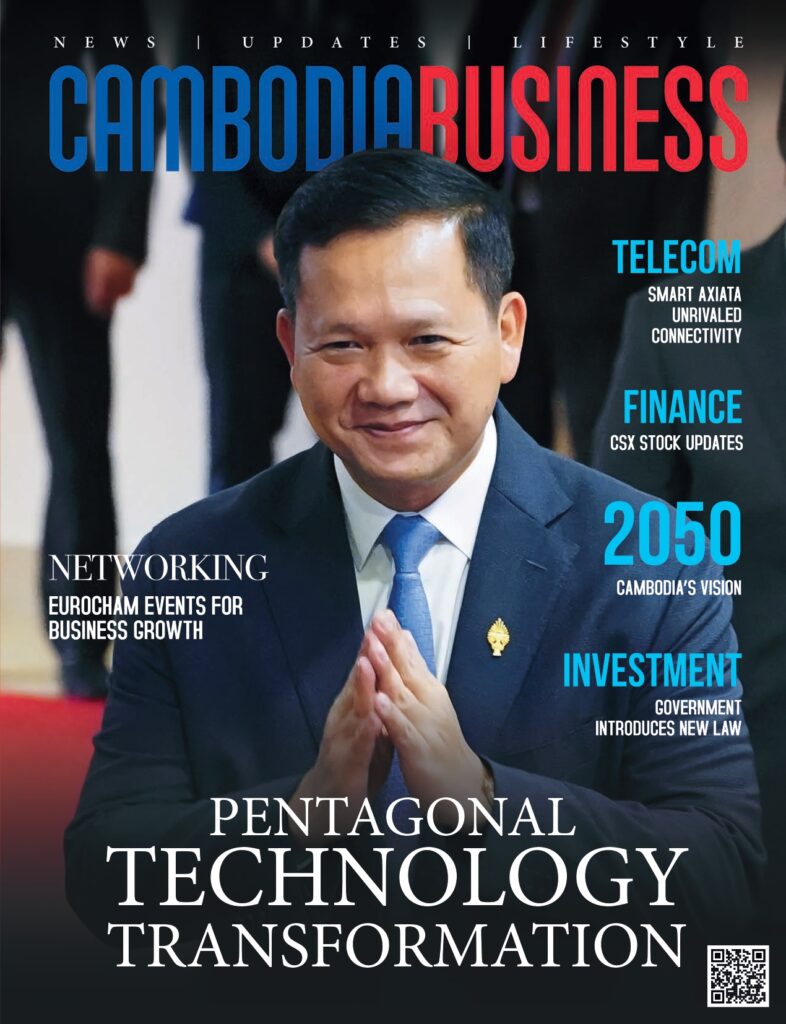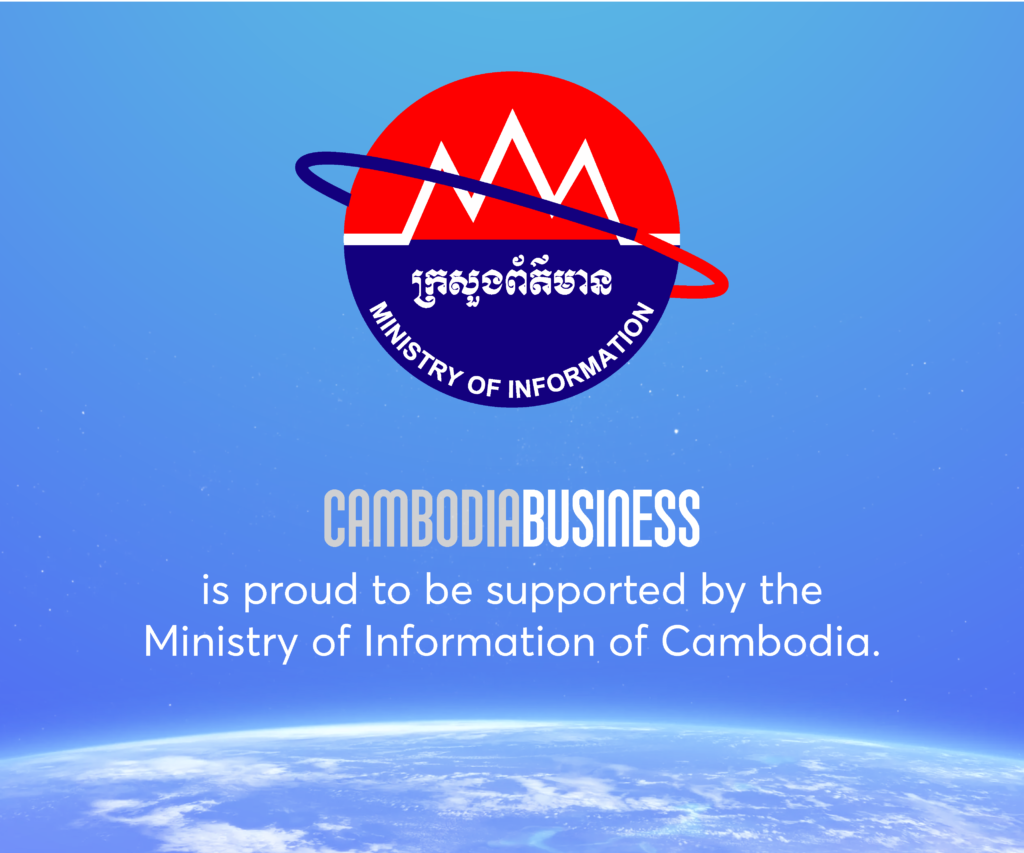Pentagonal Technology Transformation
Technology has been identified as one of the five key priorities for the Pentagonal StrategyPhase I that the Royal Government of Cambodia (RGC) for the seventh legislature of the National Assembly (NA) has implemented since its first plenary session of the Council for Ministers chaired by Prime Minister Hun Manet on August 24, 2023 at the Peace Palace. Prime Minister Hun Manet stated at the meeting that the Pentagonal StrategyPhase I has been implemented for first five of the next 25 years for the RGC to pass the five successive phases of the entire Pentagonal Strategy that is in line with its political platform for each legislature of the NA and each phase will be adjusted on actual contexts in the country and the world. The Pentagonal Strategy-Phase I has two key historical milestones that include to safeguard and nurture peace and to build and strengthen the foundations to accelerate the nation’s
[Our country’s] economic base has shifted from the one that relied almost entirely on traditional agriculture to the one with a broad and robust economic base”
economic development to achieve the milestone becoming an uppermiddle-income country by 2030 and subsequently move forward to becoming a high-income country by 2050. People, road, water, electricity and technology are the five key priorities of the Pentagonal Strategy-Phase I, while growth, employment, equity, efficiency and sustainability are the five mottos along with five strategic objectives that include to ensure crisis-resilient economic growth at around 7 percent per year on average and to increase jobs—quantity and quality. “[Our country’s] economic base has shifted from the one that relied almost entirely on traditional agriculture to the one with a broad and robust economic base, which is attractive to new and high value-added industries… the [government] identifies five key priorities … namely people, road, water, electricity and technology that clearly reflected in the strategic pentagons in the whole structure of the strategy,” said Prime Minister Hun Manet.
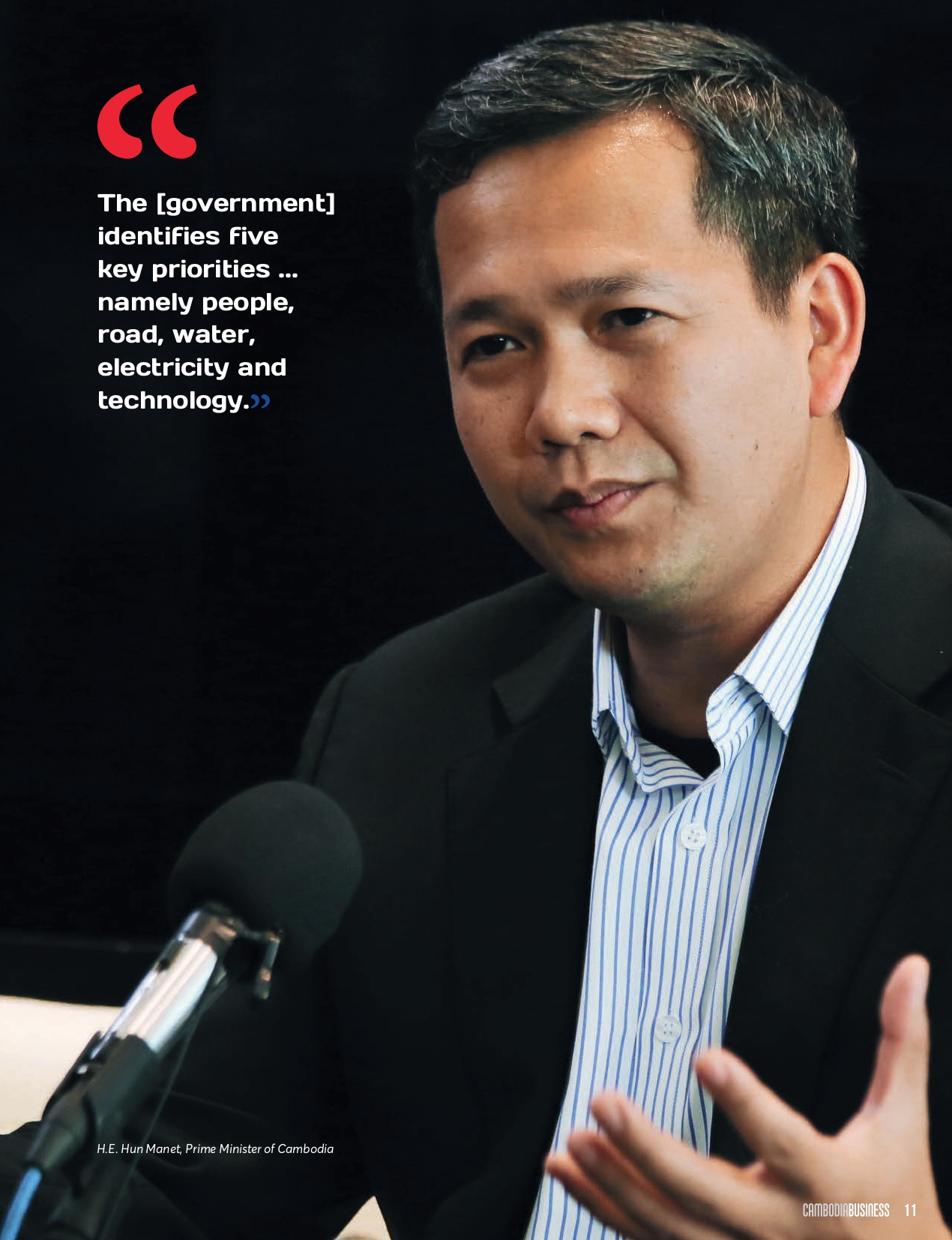
Prime Minister Hun Manet also indicated that the other strategic objectives include to achieve the poverty reduction targeting of below 10 percent and to continue to keep the poverty rate to a minimum and to continue to strengthen governance capacity and improving the quality of national and sub-national public institutions to ensure efficiency of public services delivery. The new RGC also aims at continuing to strengthen private sector governance, and continue to promote a favorable environment for business, investment and trade and lastly to ensure sustainable socio-economic development and building resilience to climate change, according to Mr Hun Manet, who succeeded from the former Prime Minister Hun Sen since August 22. In terms of the strengthening governance capacity and improving the quality of public institutions, the RGC has also set out the core of the strategy that focuses on institutional reforms with institutional modernization of the state institutions to become modern,
competent, strong, smart and clean, by the implementation of the five strategic pentagons. The RGC has set human resource development, economic diversification and competiveness enhancement, development of private sector and employment, resilient, sustainable and inclusive development and development of digital economy and society as the five strategic pentagons of the Pentagonal Strategy-Phase I, according to Prime Minister Hun Manet. Prime Minister Hun Manet pointed out that technology is one of the four areas that the RGC set to enhance in terms of their respective quality by improving the access to education for young people related to science, technology, engineering, arts and mathematics (STEAM), which is the top of the five priorities of the pentagon 1 of the Pentagonal Strategy-Phase I.
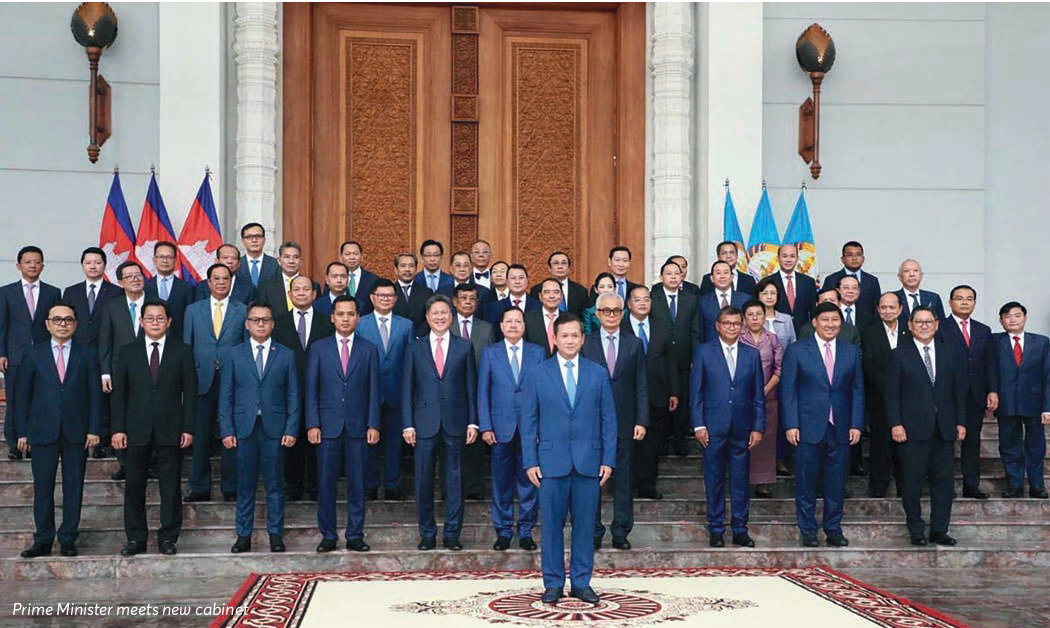
In addition to the Pentagon 1, Pentagons 2 and 5 also set technology, especially innovation as their priorities for their respective objectives. The Premier said innovation of financing mechanisms and financial products to support investment is among the five priorities of the Pentagon 2, while thefive priorities of the Pentagon 5 focus on digital economy and society. The five priorities of the Pentagon 5include building digital government and digital citizens, development of digital economy, digital business, e-commerce, and digital innovative system, building and development of digital infrastructures, trustworthiness building in digital system and development of financialtechnology, according to Prime Minister Hun Manet. Speaking at the press conference at the National Assembly after he left his premiership of Cambodia, Former Prime Minister Hun Sen said that the RGC with cabinet’s members who are mostly young blood will develop and employ technology, which is one of their priorities, to take Cambodia out of the least-developed country (LDC) status and move to next levels. The former premier also emphasized that to take Cambodia to the achievements of higher economic growth as high as the rate before the Covid-19 pandemic and becoming the upper-middle-income and high-income in 2030 and 2050 respectively, while Cambodia has been facing completed external challenges such as negative impacts of Russia-Ukraine disputes. “The new generation of the new cabinet is mostly young and they will be able to work faster in the digital economy development as they have high capacity in technology, which is very suitable and consistent with the digital era. We trust them and this is one of the reasons behind the transferring these jobs to them. We can’t not pass it to them without confidence,” he said.
The Ministry of Economy and Finance (MEF) of new RGC on August 29, 2023 released a Sub-decree on the Establishment and Addition of the General Department of Information Technology for the Management of Public Finance that will be operated under MEF. The Sub-decree was signed by the former Prime Minister Hun Sen August 15, 2023 when he remained the Prime Minister. According to the Sub-decree, the General Department of Information Technology for the Management of Public Finance will lead and manage the process of modernization of the government’s public financial management systems with developing strategies, plans and laws in order to provide support in strengthening the effectiveness of the public finance. The general department will also tasked to collaborate with other relevant institutions and/or general departments under the MEF in the development and upgrading of technical policies for the information technology, digitalization, safety enhancement
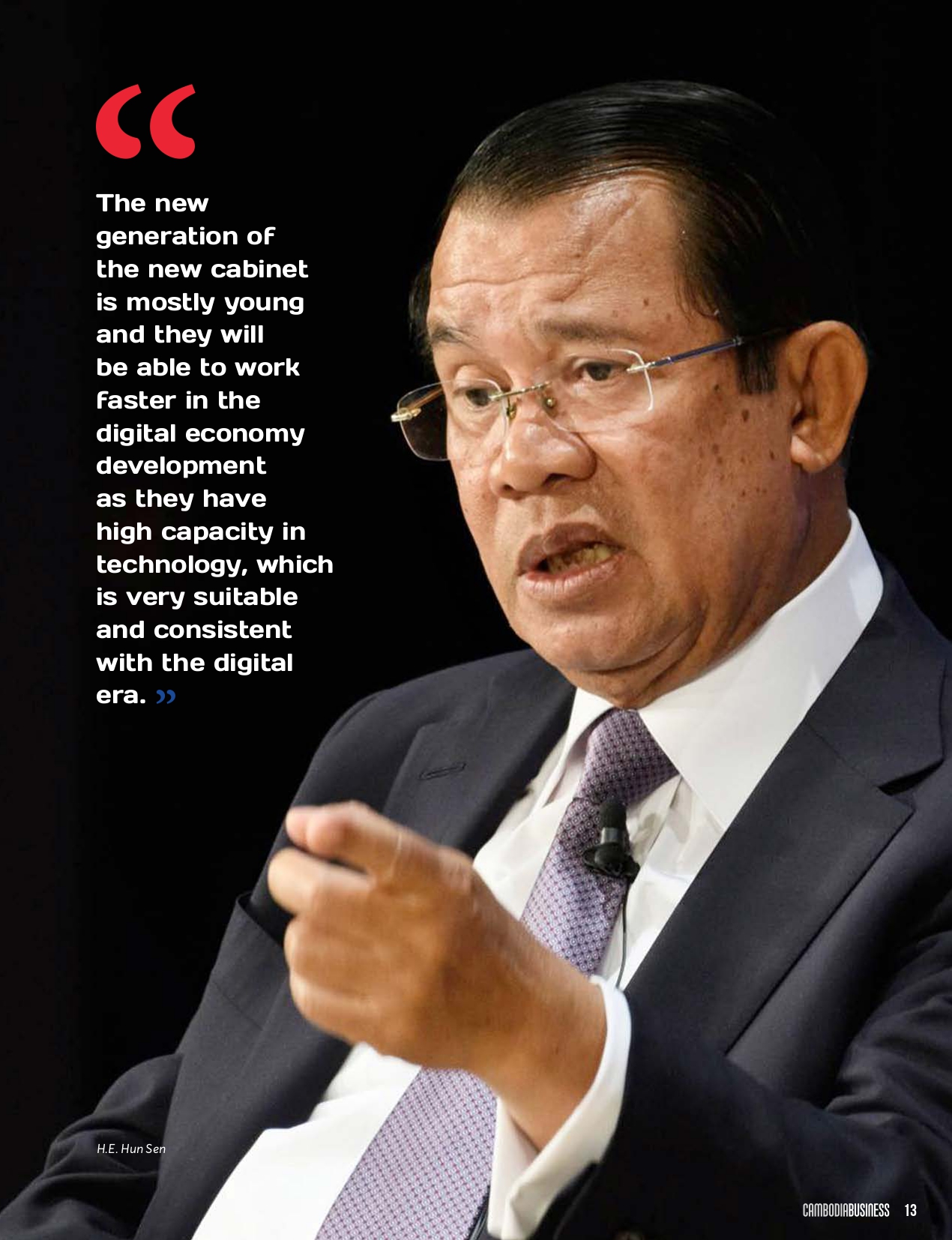
and project implementation after getting assignments from top official of MEF in the management of public finance. Both national and sub-national government’s institutions that use information technology in their public financial management woul need facilitation from the General Department of Information Technology for the Management of Public Finance to make sure that their systems are operated and managed high effectively and lowest risk in terms of technology. The new Cambodian government’s MEF will run the General Department of Information Technology for the Management of Public Finance by appointing a director general, one deputy director general and some directors of departments under the general department and those directors of departments will receive technical support from some deputy directors. The new general department will also have another task, which is the preparation of budgets to make sure that its operations will move forward sustainable with the development of information technology, technical supports, information technology infrastructures, communications systems under the main task to manage public finance effectively. To be ready for the implementation of the Pentagonal Strategy-Phase I that also set technology as a priority, Deputy Prime Minister and Minister of Economy and Finance Aun Pornmoniroth proposed for the establishment of the General Department of Digital Economy that will divided into Departments of General Affairs, Digital Economy Infrastructure and Digital Economy Programs. In response to the proposal, Former Prime Minister issued a sub-decree to form the General Department of Digital Economy to direct, regulate and develop the digital economy in Cambodia by participating in developing and implementing policies, strategies, plans, projects, programs, action plans, laws and other regulations on digital economy. According to a local media outlet’s report, the State Secretariat of Civil Aviation (SSCA) has updated its strategic plan to be consistent with the Pentagonal Strategy-Phase I for in terms of digitalization the industry in Cambodia in the seventh legislature of the NA. The industry that includes the SSCA itself, air traffic inspection, airport operations and airlines operations.








